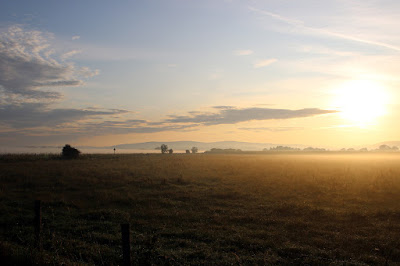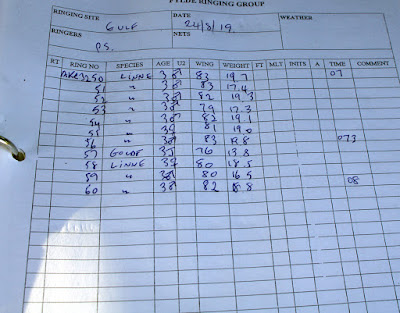Monday was the last of our child minding for the summer holidays, so I couldn’t make it up to Oakenclough where the long drive there and back makes for half a day’s commitment.
Instead I made a 15 minute drive to Gulf Lane and grabbed an hour or two ringing at the Linnets with the aim of being home for breakfast. On 24th August there was a count of 160/185 Linnets, but today more like 70/80, an unexpected drop in numbers for this time of year perhaps explained by the current availability of food in the wider countryside.
At 0900 the sky blackened from the North-West as a downpour arrived and forced an early end to my meagre catch of 6 Linnets, all first years, three of each sex, plus a single first year Reed Bunting.
Reed Bunting
Linnet
A text from Andy advised that the downpour had reached Oakenclough, soaked him to the skin and he was packing in. Did I laugh? - just a little. But he'd caught a few goodies by way of 1 Tree Pipit, 3 Willow Warblers, a Chiffchaff, a Meadow Pipit and two smart looking Bullfinch.
Bullfinch
Meanwhile just half a mile from Gulf Lane the appearance of a rare bird at Fluke Hall this weekend provoked a flood of twitchers to this otherwise quiet, mostly unmolested part of Wyre.
A wheatear species first spotted along the sea wall on 1st September and identified as an adult female Eastern Black-eared Wheatear continues to create discussion and not a little controversy, even down to birders collecting a faeces sample from the bird’s rocky shore hangout for later DNA analysis.
Poo sample
The controversy centres around the fact that the autumnal Pied Wheatear Oenanthe pleschanka and the autumnal Black-eared Wheatear Oenanthe hispanica melanoleuca look remarkably similar, so much so that such occurrences sometimes remain unassigned.
For what it’s worth, having studied the individual involved, plus a read of the Ringer’s Bible Svensson. My own thoughts were firstly that the bird was clearly a first summer/juvenile, and not an adult ,and that the mantle colour and fringes, the darkish breast with little hint of colour, the long primary projection coupled with the slight scaling on the back point to a Pied Wheatear.
Pied Wheatear?
There is of course a remote possibility that the bird could prove to a hybrid/cross of wheatear sp; but that is another controversy in the waiting should the poo sample not prove a point in someone’s favour.
This all begs an obvious question. If in error anyone ticked the "wrong" species on the list, once confirmation of the correct species is later agreed by “experts”, must those who ticked the wrong species return to the sea wall, search anew for the new bird, find and ID it, and then eat humble pie?
All this high-stakes twitching and controversy is too complicated for me. Think I will stick to being a low-key, unsophisticated ringer with nothing to say.
Linking today with Eileen's Saturday Blog.
Linking today with Eileen's Saturday Blog.













































































